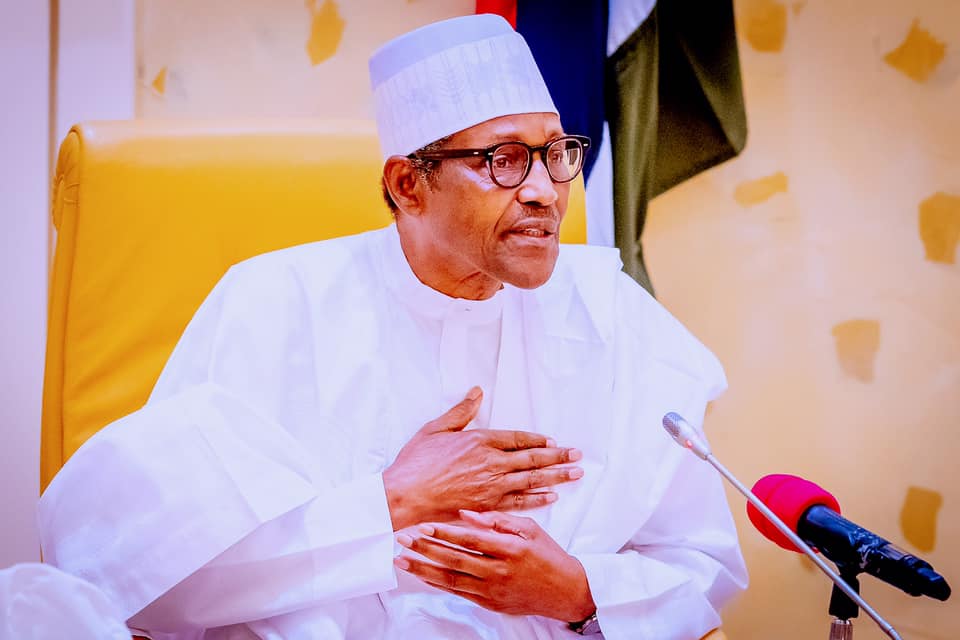President Muhammadu Buhari has said that he cannot be accused of having companies or mansions across the country, adding that he tries to keep himself clean so that he won’t be taken hostage by anyone.
President Buhari stated this on Thursday, September 9, 2021, at a town hall meeting with South- East leaders during his one-day official visit to Imo State.
‘‘Nobody can accuse me of having companies or mansions anywhere in the country and I thank God that I try to keep myself as clean as possible so that I cannot be taken, hostage.
‘‘I will do my best to ensure that Nigerians that try hard, succeed in their efforts,’’ he added.
He told South-East leaders that while fighting corruption in Nigeria had become very sophisticated and difficult, he would strive to leave a lasting legacy of integrity and accountability in the system.
‘Number One Priority’
On security issues in the country, he said with less than two years left in his eight-year tenure as President, security remains a major priority for his administration.
‘‘If there is no security, there is nothing anyone can do no matter how much you try or the initiative you have.
‘‘Security is the number one priority and then the economy. When people feel secure they will mind their own business,’’ he said.
On the 2023 elections, Buhari reaffirmed his commitment to free, fair, and credible polls, urging leaders to educate their constituencies on the need to hold their elected representatives accountable.
While acknowledging the enterprising spirit of Igbo people, the President described them as resourceful.
“The fundamental thing about the Igbo people is that there is no town you will visit in Nigeria without seeing the Igbos being in charge of either infrastructure or pharmaceutical industry.
‘‘Therefore, it is unthinkable for me that any Igbo man would consider himself not to be a part of Nigeria.
‘‘The evidence is there for everyone to see that Igbos are in charge of Nigeria’s economy,” the Nigerian leader explained.
He noted that no country can make any meaningful progress without the development of infrastructure, and regretted that successive governments at the federal level contributed to the decay of critical infrastructure in the nation.
But he promised that the Federal Government would complete ongoing key projects in the South-East, including the 2nd Niger Bridge, and railway lines and routes linking the region with other parts of Nigeria.
‘‘I firmly believe that when you get infrastructure right, Nigerians will mind their own businesses,’’ he said, adding that as a group, the Igbos stand to benefit more from the ongoing development of infrastructure in the country because ‘‘they are more enterprising’’.
President Buhari had earlier commissioned four projects executed by Governor Hope Uzodinma, including the Naze/Ihiagwa/Nekede/Obinze link road, the Balloon Driven/Flood Control drainage at Dick Tiger Road, the Egbeada Bypass road and the New Exco-Chambers, Government House, Owerri.
During his address at the commissioning of the Egbeada bypass named after a prominent son of the state, Emmanuel Iwuanyanwu, Buhari expressed satisfaction with the work done by the Imo State Government.
‘‘I am very pleased with what I have seen and I assure you that I will support Imo State within the Constitution of the Federal Republic of Nigeria,’’ he said.
In his remarks at the town hall meeting, Governor Uzodinma said Ndigbo believe in a united Nigeria predicated on ‘‘justice, equity and fairness”.
He thanked the President for addressing the interests of Ndi Igbo through deliberate policy initiatives – including the ongoing construction of the 2nd Niger Bridge – designed to give the people a sense of belonging.
Governor Uzodinma said the region would remain grateful to the President for approving the establishment of a Naval Base in Oguta Local Government Area of the state, adding that as time unfolds, the economic benefits of the base would manifest.
He equally commended the President for strongly supporting the appointment of two prominent Igbos into key international organisations – Dr Ngozi Okonjo-Iweala, Director-General of the World Trade Organisation, WTO, and Dr Chikwe Ihekweazu, Assistant Director-General of Health Emergency Intelligence, World Health Organisation.







